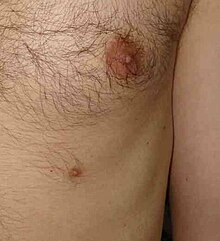Medical condition
| Supernumerary nipple | |
|---|---|
| Other names | Third nipple, triple nipple, accessory nipple, polythelia |
 | |
| Specialty | Medical genetics, dermatology |
A supernumerary nipple is an additional instance of nipple occurring in mammals, including humans and monkeys. They are often mistaken for moles. Studies variously report the prevalence of supernumerary nipples as approximately 1 in 18 and 1 in 40.
The nipples appear along the two vertical "milk lines", which start in the armpit on each side, run down through the typical nipples and end at the groin. They are classified into eight levels of completeness, from a simple patch of hair to a milk-bearing breast in miniature.
Types
| Type | Glandular tissue | Nipple | Areola | Fat tissue | Hair patch |
|---|---|---|---|---|---|
| 1 | yes | yes | yes | yes | |
| 2 | yes | yes | |||
| 3 | yes | yes | |||
| 4 | yes | ||||
| 5 ("pseudomamma") | yes | yes | yes | ||
| 6 ("polythelia") | yes | ||||
| 7 ("polythelia areolaris") | yes | ||||
| 8 ("polythelia pilosa") | yes |
Polythelia refers to the presence of an additional nipple alone, while polymastia denotes the much rarer presence of additional mammary glands.
Although usually presenting on the milk line, pseudomamma can appear as far away as the foot.
Clinical significance
| This section does not cite any sources. Please help improve this section by adding citations to reliable sources. Unsourced material may be challenged and removed. (February 2023) (Learn how and when to remove this message) |
Clinical presentation
It may remain undetected. Occasionally, the supernumerary nipple is noticed when hormonal changes during adolescence, menstruation, or pregnancy cause increased pigmentation, fluctuating swelling, tenderness, or even lactation.
Associations
It is said to be found in association with many syndromes and other conditions:
A possible connection with mitral valve prolapse has been proposed.
Treatment and prognosis
Most often no treatment is required; however, a protruding embarrassing supernumerary nipple can be removed surgically, if desired. Removal using liquid nitrogen cryotherapy has also been described.
Society and culture
Television
The Triple Nipple Club is a documentary shown on Channel 4 which explored the biological mystery of the supernumerary nipple. First broadcast on 2 January 2008, it was directed and produced by Dan Louw and commissioned as part of Channel 4's First Cut series. The film focuses on Louw's attempts to understand why he was born with extra nipples, a condition he shares with the likes of Mark Wahlberg, Lily Allen, and Tilda Swinton, as well as TV and film characters such as the James Bond villain Francisco Scaramanga and Chandler Bing from Friends. Fascinated and confused by this seemingly pointless mutation, Louw sets off on a personal journey of discovery to try and unwrap "the riddle of the triple nipple". He starts out by consulting the man in the street and a renowned teratologist, an expert in physical mutations. After testing the notion that extra nipples could be a sign of fertility, he discovers that they are actually an atavism, or evolutionary 'holdover'—a sign of how humans evolved.
English pop-star Harry Styles confirmed in 2017 that he has four nipples as a result of the condition.
See also
- Accessory breast
- Grace Sherwood, sentenced to jail for witchcraft partly on the basis of having "two things like titts on her private parts of a black coller "
- Polydactyly
- Witch's mark
References
- ^ Rapini, Ronald P.; Bolognia, Jean L.; Jorizzo, Joseph L. (2007). Dermatology: 2-Volume Set. St. Louis: Mosby. ISBN 978-1-4160-2999-1.
- Supernumerary nipples: prevalence, size, sex and side predilection – a prospective clinical study, H. Schmidt, European Journal of Pediatrics volume 157, pages 821–823 (1998).
- Occurrence of Supernumerary Nipples in Newborns Francis Mimouni, MD; Paul Merlob, MD; Salomon H. Reisner, MB, ChB, Am J Dis Child. 1983;137(10):952-953.
- Kajava Y. "The proportions of supernumerary nipples in the Finnish population". Duodecim 1915; 1:143-70.
- Revis, Don R. Jr. "Breast Embryology". eMedicine. Archived from the original on 22 December 2008. Retrieved 3 December 2007.
- Camacho F.; González-Cámpora R. (1998). "Polythelia pilosa: A Particular Form of Accessory Mammary Tissue". Dermatology. 196 (3): 295–298. doi:10.1159/000017924. PMID 9621135. S2CID 25211741.
- Conde, Délio Marques; Kashimoto, Eiji; Torresan, Renato Zocchio; Alvarenga, Marcelo (2006). "Pseudomamma on the foot: An unusual presentation of supernumerary breast tissue". Dermatology Online Journal. 12 (4): 7. doi:10.5070/D339n411b8. PMID 17083862. Retrieved 3 December 2007.
- Rajaratnam K, Kumar PD, Sahasranam KV (2000). "Supernumerary nipple as a cutaneous marker of mitral valve prolapse in Asian Indians". Am. J. Cardiol. 86 (6): 695–697. doi:10.1016/S0002-9149(00)01057-2. PMID 10980229.
- Throwback | First Cut: The Triple Nipple Club | Free Video Clips from Channel 4
- Channel 4 - FourDocs blog - First Cut line-up
- AskMen.com - Mark Wahlberg's third nipple love
- YouTube - Lilly Allen Third Nipple
- McCarthy, Susan (8 June 1999). "Why do men have nipples?". Salon. Archived from the original on 5 December 2022.
- Donahue, Rosemary (19 July 2017). "Harry Styles Has Four Nipples, and That's More Common Than You Think". Allure. Archived from the original on 17 January 2023. Retrieved 17 January 2023.
External links
| Classification | D |
|---|---|
| External resources |
| Congenital malformations and deformations of the breast | |
|---|---|
| Breast | |
| Nipple | |